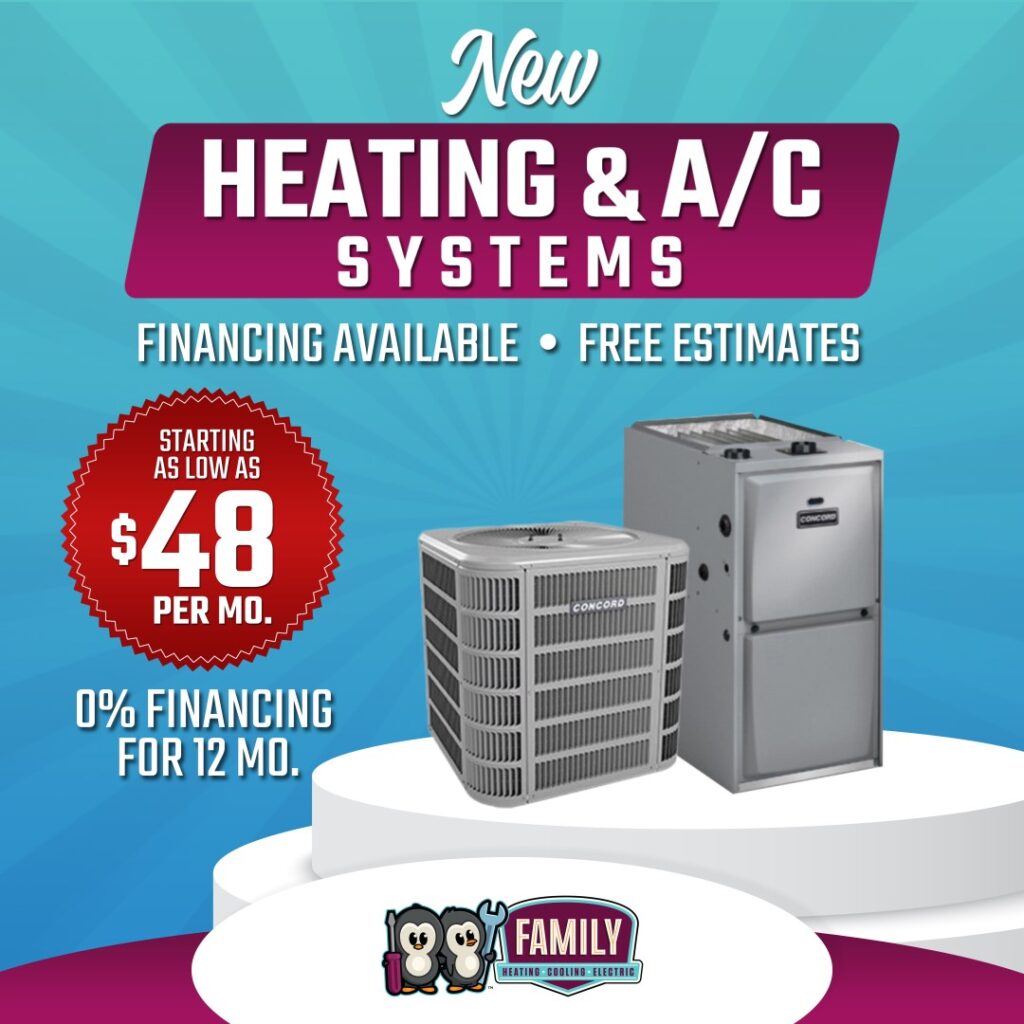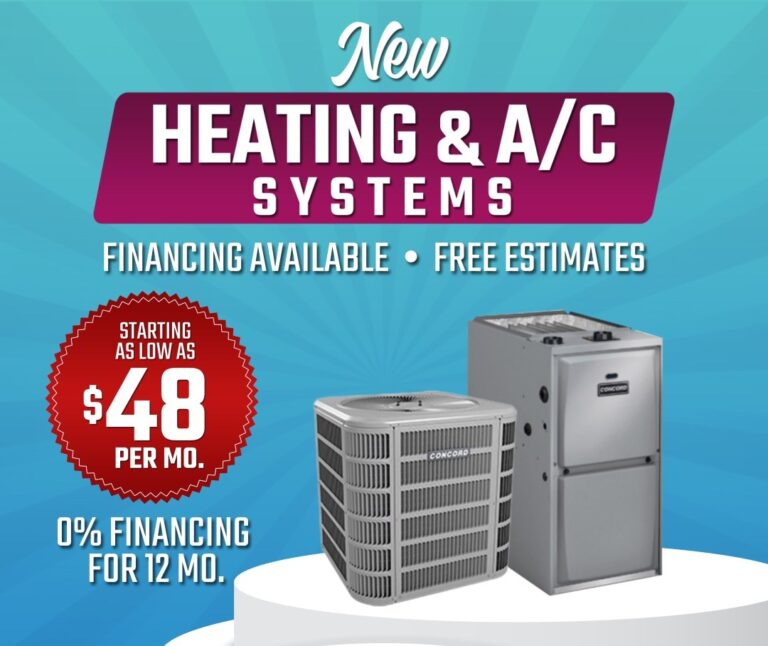
When You Know It’s Time for a Change… Here’s a Guide for Choosing the Best HVAC System for You!
Have you been experiencing rising energy bills, inconsistent temperatures, strange noises, or poor indoor air quality? These signs may indicate that your HVAC system is struggling. Like any other technology, HVAC systems can wear out over time resulting in inefficiencies, increased energy costs, and reduced comfort.
When you’ve recognized these issues and realize it’s time for a change, finding a starting point can be daunting. Selecting the right HVAC system for your home is important as it significantly impacts your comfort, energy efficiency, and budget. But fear not! We’re here to help you navigate these waters. We’ve compiled a comprehensive guide outlining the key factors to consider when selecting the best heating and AC system to assist you in making an informed decision that aligns with the needs of your household.
𝟭. 𝗔𝘀𝘀𝗲𝘀𝘀 𝗬𝗼𝘂𝗿 𝗛𝗲𝗮𝘁𝗶𝗻𝗴 𝗮𝗻𝗱 𝗖𝗼𝗼𝗹𝗶𝗻𝗴 𝗡𝗲𝗲𝗱𝘀:
Start by evaluating your home’s heating and cooling requirements. Consider factors such as square footage, insulation, ceiling height, number of windows, and regional climate. This will help you determine the appropriate size and type of HVAC system that can efficiently meet your demands.
𝟮. 𝗘𝗻𝗲𝗿𝗴𝘆 𝗘𝗳𝗳𝗶𝗰𝗶𝗲𝗻𝗰𝘆:
To save money & reduce your carbon footprint, opt for an energy-efficient HVAC system. Look for systems with high Seasonal Energy Efficiency Ratio (SEER) & Heating Seasonal Performance Factor (HSPF) ratings. Additionally, check for ENERGY STAR certification, which indicates that the system meets stringent energy efficiency standards set by the Environmental Protection Agency (EPA).
𝟯. 𝗖𝗼𝗻𝘀𝗶𝗱𝗲𝗿 𝘁𝗵𝗲 𝗧𝘆𝗽𝗲 𝗼𝗳 𝗦𝘆𝘀𝘁𝗲𝗺:
Each system type has its advantages and suitability depending on factors such as climate, available space, and budget.
🔎 𝗙𝘂𝗿𝗻𝗮𝗰𝗲:
In areas with extremely cold winters, high-efficiency furnaces, including condensing furnaces, are commonly used to ensure effective heating while minimizing energy consumption.
🔎 𝗕𝗼𝗶𝗹𝗲𝗿𝘀:
These distribute heat evenly through radiators or radiant floor heating systems, making them suitable for maintaining comfort in large homes and buildings during cold weather.
🔎 𝗛𝗲𝗮𝘁 𝗣𝘂𝗺𝗽𝘀:
Heat pumps are typically, the preferred choice in warmer climates due to their ability to provide efficient cooling during hot summers and adequate heating during mild winters.
🔎 𝗗𝘂𝗰𝘁𝗹𝗲𝘀𝘀 𝗠𝗶𝗻𝗶–𝗦𝗽𝗹𝗶𝘁 𝗦𝘆𝘀𝘁𝗲𝗺𝘀:
Mini-splits are versatile and can be suitable for various climates, but they are particularly advantageous in homes without existing ductwork or in spaces where ductwork installation is impractical or costly. They provide efficient heating and cooling with individual zone control.
🔎 𝗛𝘆𝗯𝗿𝗶𝗱 𝗦𝘆𝘀𝘁𝗲𝗺𝘀:
Hybrids are beneficial in regions with variable climates where temperatures fluctuate significantly throughout the year. These systems automatically switch between the heat pump and furnace based on outdoor conditions, maximizing energy efficiency and comfort.
𝟰. 𝗣𝗿𝗼𝗽𝗲𝗿 𝗦𝗶𝘇𝗶𝗻𝗴:
When it comes down to it, size matters. An oversized unit can lead to short cycling, inefficient operation, and uneven temperature distribution, while an undersized system may struggle to adequately heat or cool your home. Leave it to the professionals to perform a load calculation to determine the appropriate size for your home.
𝟱. 𝗡𝗼𝗶𝘀𝗲 𝗟𝗲𝘃𝗲𝗹:
Pay attention to the noise level produced by the heating and AC system, especially if the system is installed in a noise-sensitive area of your home, or if you have a preference for quieter operation.
𝟲. 𝗦𝗺𝗮𝗿𝘁 𝗙𝗲𝗮𝘁𝘂𝗿𝗲𝘀 𝗮𝗻𝗱 𝗖𝗼𝗻𝗻𝗲𝗰𝘁𝗶𝘃𝗶𝘁𝘆:
Explore systems with smart features and connectivity options, such as programmable thermostats, Wi-Fi-enabled controls, and compatibility with home automation systems. These features offer convenience, energy savings, and the ability to control your HVAC system remotely.
𝟳. 𝗜𝗻𝗱𝗼𝗼𝗿 𝗔𝗶𝗿 𝗤𝘂𝗮𝗹𝗶𝘁𝘆:
Beyond heating and cooling, look for systems equipped with advanced air filtration, humidification, and ventilation capabilities to ensure a healthier and more comfortable indoor environment for you and your family. Poor indoor air quality can exacerbate allergies, respiratory issues, and other health problems, so investing in air quality solutions is worth considering.
𝟴. 𝗜𝗻𝘀𝘁𝗮𝗹𝗹𝗮𝘁𝗶𝗼𝗻 𝗮𝗻𝗱 𝗠𝗮𝗶𝗻𝘁𝗲𝗻𝗮𝗻𝗰𝗲:
Factor in installation costs and ongoing maintenance requirements when budgeting for your HVAC system. Hire qualified professionals to install your system and schedule regular maintenance checks to ensure continued peak performance.
𝟵. 𝗪𝗮𝗿𝗿𝗮𝗻𝘁𝘆 𝗮𝗻𝗱 𝗦𝘂𝗽𝗽𝗼𝗿𝘁:
Before making a purchase, inquire about the manufacturer’s warranty coverage, any maintenance requirements, and the availability of technical support after installation. A comprehensive warranty can provide peace of mind and protect you from unexpected repair costs.
𝟭𝟬. 𝗖𝗼𝘀𝘁 𝗮𝗻𝗱 𝗕𝘂𝗱𝗴𝗲𝘁:
While it’s tempting to opt for the cheapest option, prioritize value and long-term savings over upfront costs. Factor in the initial purchase price, installation costs, energy efficiency, and potential savings on utility bills over the life of the system.
Remember- we’re here for you!
While navigating these complexities may seem daunting, remember that you’re not alone in this journey! At Family Heating, Cooling, & Electric we understand the importance of finding the right heating and cooling solution tailored to your unique needs. Our team of experts is here to guide you every step of the way, cutting through the noise to identify the best options that align with your family’s requirements.
Whether you’re unsure where to start, feeling overwhelmed by the choices, or simply need expert advice, we’ve got you covered. Contact Family at (774) 264-3695 to schedule a consultation and let us help you make an informed decision that enhances the comfort and efficiency of your home.
*Ask about our amazing rebates! The best part- We take care of filing for you.








